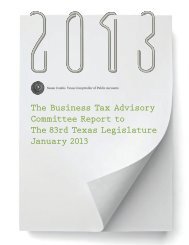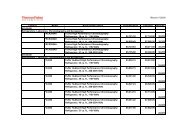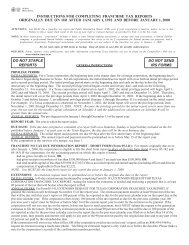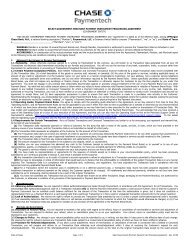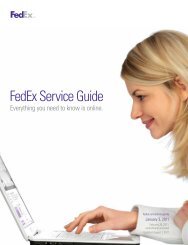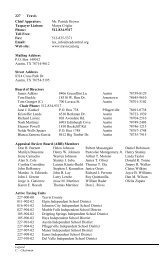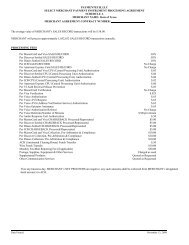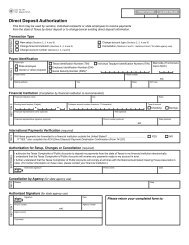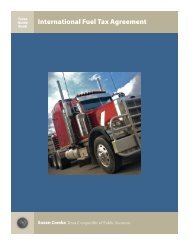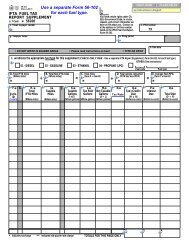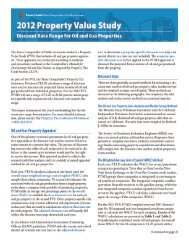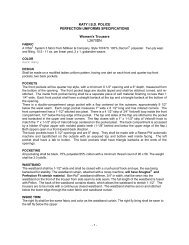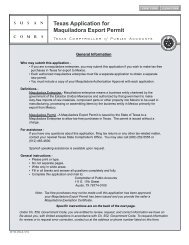Contracts Management Guide - Texas Comptroller of Public Accounts
Contracts Management Guide - Texas Comptroller of Public Accounts
Contracts Management Guide - Texas Comptroller of Public Accounts
Create successful ePaper yourself
Turn your PDF publications into a flip-book with our unique Google optimized e-Paper software.
� Contract value and complexity;<br />
� Length <strong>of</strong> contract, period <strong>of</strong> performance and/or delivery requirements;<br />
� Procurement history <strong>of</strong> the supplies or services required and expertise <strong>of</strong> the contractor;<br />
� Urgency <strong>of</strong> delivery schedule;<br />
� Agency’s prior experience with the contractor;<br />
� Any special or unusual contract requirements; and<br />
� Any special or unusual payment requirements.<br />
Post Award Conference Agenda<br />
It should be made clear at the beginning <strong>of</strong> the conference that the purpose <strong>of</strong> the meeting is to explain or clarify<br />
contract requirements and not to make changes to the contract or re-negotiate the contract terms. The post award<br />
conference agenda should cover the following:<br />
1. Introduction. Introduce all participants and identify agency and contractor key personnel.<br />
2. Scope. Discuss the scope <strong>of</strong> the contract (i.e., what the agency is buying). Although this may seem overly<br />
simplistic, a total and complete meeting <strong>of</strong> the minds on this point will avoid problems during the life <strong>of</strong> the<br />
contract.<br />
3. Terms. Summarize contract terms and conditions, particularly any special contract provisions. This can avoid<br />
any misunderstandings later on, and allows the contractor to gain a better understanding <strong>of</strong> the terms prior to<br />
beginning work.<br />
4. Requirements. Discuss the technical and reporting requirements <strong>of</strong> the contract. The technical requirements<br />
may be discussed as part <strong>of</strong> the Scope, above. It is vital that the contractor and the agency have a meeting <strong>of</strong><br />
the minds regarding technical requirements. The contractor must understand the importance <strong>of</strong> any reports<br />
required under the contract and the importance <strong>of</strong> submitting them in accordance with contract requirements.<br />
5. Administration. Applicable contract administration procedures, including contract monitoring and progress<br />
measurement should be discussed.<br />
6. Rights. The rights and obligations <strong>of</strong> both parties and the contractor performance evaluation procedures<br />
should be summarized. The agency should explain that contractor will be evaluated on their performance<br />
both during and at the conclusion <strong>of</strong> the contract and that such information may be considered in the<br />
selection <strong>of</strong> future contracts.<br />
7. Potential Problems. Potential contract problem areas and possible solutions should be addressed. Any issues<br />
or contract areas that the agency believes may lead to a problem later on, or may be subject to differing<br />
interpretations, should be discussed.<br />
8. Payment. Invoicing requirements and payment procedures should be discussed, especially if the payment will<br />
be made according to milestones achieved by the contractor.<br />
9. Authority. Agency personnel should explain the limits <strong>of</strong> their authority and obtain the same information<br />
regarding contractor personnel.<br />
After the conference, the agency should prepare a summary <strong>of</strong> the meeting for the contract file which details the topics<br />
covered. The summary should include areas requiring resolution, a list <strong>of</strong> participants, and in particular, those<br />
61



